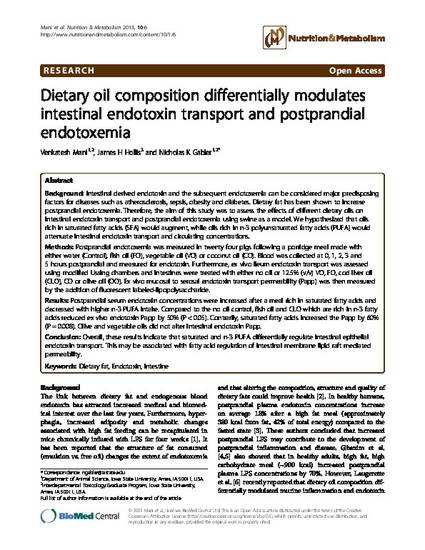
Article
Dietary oil composition differentially modulates intestinal endotoxin transport and postprandial endotoxemia
Nutrition & Metabolism
Document Type
Article
Disciplines
Publication Version
Published Version
Publication Date
1-1-2013
DOI
10.1186/1743-7075-10-6
Abstract
Background: Intestinal derived endotoxin and the subsequent endotoxemia can be considered major predisposing factors for diseases such as atherosclerosis, sepsis, obesity and diabetes. Dietary fat has been shown to increase postprandial endotoxemia. Therefore, the aim of this study was to assess the effects of different dietary oils on intestinal endotoxin transport and postprandial endotoxemia using swine as a model. We hypothesized that oils rich in saturated fatty acids (SFA) would augment, while oils rich in n-3 polyunsaturated fatty acids (PUFA) would attenuate intestinal endotoxin transport and circulating concentrations.
Methods: Postprandial endotoxemia was measured in twenty four pigs following a porridge meal made with either water (Control), fish oil (FO), vegetable oil (VO) or coconut oil (CO). Blood was collected at 0, 1, 2, 3 and 5 hours postprandial and measured for endotoxin. Furthermore, ex vivo ileum endotoxin transport was assessed using modified Ussing chambers and intestines were treated with either no oil or 12.5% (v/v) VO, FO, cod liver oil (CLO), CO or olive oil (OO). Ex vivo mucosal to serosal endotoxin transport permeability (Papp) was then measured by the addition of fluorescent labeled-lipopolysaccharide.
Results: Postprandial serum endotoxin concentrations were increased after a meal rich in saturated fatty acids and decreased with higher n-3 PUFA intake. Compared to the no oil control, fish oil and CLO which are rich in n-3 fatty acids reduced ex vivo endotoxin Papp by 50% (P < 0.05). Contrarily, saturated fatty acids increased the Papp by 60% (P = 0.008). Olive and vegetable oils did not alter intestinal endotoxin Papp.
Conclusion: Overall, these results indicate that saturated and n-3 PUFA differentially regulate intestinal epithelial endotoxin transport. This may be associated with fatty acid regulation of intestinal membrane lipid raft mediated permeability.
Rights
This is an open access article distributed under the creative commons attribution license, which permits unrestricted use, distribution, and reproduction in any medium, provided the original work is properly cited.
Copyright Owner
Mani, et al
Copyright Date
2013
Language
en
File Format
application/pdf
Citation Information
Venkatesh Mani, James H. Hollis and Nicholas K. Gabler. "Dietary oil composition differentially modulates intestinal endotoxin transport and postprandial endotoxemia" Nutrition & Metabolism Vol. 10 Iss. 6 (2013) p. 1 - 9 Available at: http://works.bepress.com/james_hollis/9/

This article is from Nutrition & Metabolism; 10(6); 2013; 1-9. Doi: 10.1186/1743-7075-10-6. Posted with permission.